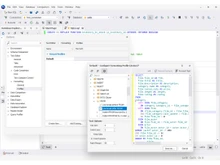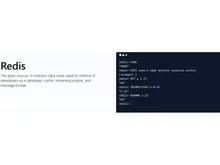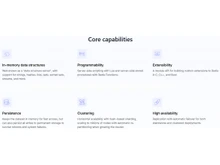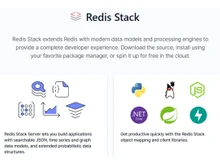Redis and PostgreSQL are both popular databases, but they have different use cases and features. Redis is an in-memory database, ideal for high performance, fast data access, and caching. PostgreSQL, on the other hand, is a relational database that supports complex queries, transactions, and data consistency.
In this write-up, we will be discussing the major differences between Redis and PostgreSQL on the basis of their features, usability, customer support, performance, ease of use, and other metrics.
Redis vs. PostgreSQL: An Overview
Redis is an in-memory data structure store that can be used as a database, message queue, or cache. It is known for its high performance, reliability, and flexibility, making it a popular choice for web and mobile applications.
PostgreSQL is one of the most powerful open-source relational database management systems (RDBMS) that supports SQL (Structured Query Language) and is widely used in enterprises for its reliability, scalability, and advanced features. It is known for its rich features set, which includes the support for complex queries, advanced data types, and robust security features.
Redis vs. PostgreSQL: Key Differences
There are several key differences between Redis and PostgreSQL. These are:
- Redis is an in-memory data structure store used as a database, solid-state transfer engine, or message broker. On the other hand, PostgreSQL is an open-source database system known for its architecture, reliability, and robust features set.
- Redis is optimized for fast data retrieval and manipulation, while PostgreSQL is focused on data consistency and ACID compliance.
- Redis has a simpler architecture and is often used for caching, session storage, and real-time analytics, while PostgreSQL is a more robust and feature-rich database system suitable for data consistency.
Redis vs. PostgreSQL: In Terms of Features
- JSON Support: Redis has limited support for JSON data, allowing for storing JSON strings but lacking built-in support for querying and manipulating JSON data. On the other hand, PostgreSQL and other PostgreSQL alternatives have extensive support for JSON data, including a dedicated JSON data type, rich functions and operators for querying and manipulating JSON, and efficient indexing of JSON data.
- Full-Text Search: Redis does not provide built-in, full-text search capabilities, but basic string-matching operations are available. It requires integration with external search engines or specialized full-text search solutions. PostgreSQL, on the other hand, includes a powerful full-text search engine with indexing, relevance ranking, stemming, and phrase-searching capabilities.
- Implementation: Redis is implemented in C and with a model similar to Node, JS, etc. On the other hand, PostgreSQL’s online product documentation is comprehensive and guides users in a step-by-step manner.
- Concurrency and Locking: Redis efficiently handles concurrent client connections using a non-blocking I/O architecture. On the other hand, PostgreSQL employs a multi-process architecture and supports concurrent read and write operations through sophisticated locking mechanisms. It provides various levels of locking, ensuring data integrity and allowing for high scalability in multi-user environments.
- Data Model: Redis has a flexible way of storing data, where you can use different structures like strings, lists, sets, and hashes. This is useful when the data is not fixed and can change often. PostgreSQL, on the other hand, follows a more organized approach and offers a predefined structure for the data, allowing complex queries and ensuring data consistency. It works well for applications that need advanced querying and strict data integrity.
Redis vs. PostgreSQL: Usability
Redis and a few other Redis alternatives are great for managing user sessions, and they are easy to set up. Apart from that, they also work well with other technologies like Spring in Java. On the other hand, PostgreSQL is excellent for handling relational data and is particularly known for its analytics capabilities, data availability, and consistency.
Redis vs PostgreSQL: Customer Support
Redis support team is excellent at addressing issues, providing immediate solutions, and avoiding the need for escalation. However, for PostgreSQL support, there are experienced technical support companies like Enterprise DB or Percona available, to resolve any problems.
Redis vs. PostgreSQL: Performance and Scalability
Redis is a fast data storage that keeps data in memory, allowing for quick read and write operations. It's great for applications that need fast responses, like caching or real-time analytics. On the other hand, PostgreSQL is not as fast as Redis, but it's still efficient and handles large datasets. It can scale by adding more resources to a single server or by using a distributed architecture.
Redis vs. PostgreSQL: Data Persistence Options
Redis provides different options for data persistence, including snapshotting, append-only files, etc. to ensure data durability. However, these increase disk I/O which impacts performance. PostgreSQL, on the other hand, uses various mechanisms such as write-ahead logging (WAL) and point-in-time recovery (PITR) to ensure data consistency and durability, even during system failures.
Redis vs. PostgreSQL: Use Cases
Redis is well-suited for analytics, caching, session management, and pub-sub messaging. It allows for low latency which makes it suitable for websites having high-traffic and real-time leaderboards. In contrast, PostgreSQL's data integrity and SQL capabilities make it suitable for applications requiring complex querying, data storage, and data consistency.
Redis vs. PostgreSQL: Ease of Use
Redis is popular for its usability. It is simple to set up and use due to its command-line interface, key-value store model, and minimal configuration. On the contrary, PostgreSQL is for seasoned developers, it is powerful and adaptable because it has extensive features and capabilities. It also offers an extensive ecosystem of libraries and frameworks, a powerful command-line interface, and tools for graphical user interfaces.
Redis vs. PostgreSQL: Community
The Redis community is active in information sharing, helping assistance, and creating new plugins and features. It provides both commercial goods and services as well as enterprise support solutions. PostgreSQL, on the other hand, helps with ongoing development and enhancements. It keeps up with improvements with the help of PostgreSQL community's extensive documentation, mailing groups, forums, and conferences.
Redis vs. PostgreSQL: Support for Data Replication
Redis supports asynchronous data replication while PostgreSQL offers synchronous as well as asynchronous data replication. It offers logical replication, streaming replication, and more to make data consistent.
Verdict: Redis vs PostgreSQL
Redis and PostgreSQL are popular databases with different use cases. Redis is an in-memory database known for high performance and caching, while PostgreSQL is a relational database with complex querying and data consistency. Redis has limited JSON support and no built-in full-text search, whereas PostgreSQL has extensive JSON support and robust full-text search capabilities. Redis is implemented in C with an event-driven architecture, while PostgreSQL has comprehensive documentation. Redis is single-threaded but handles concurrent connections well, while PostgreSQL supports concurrent operations through locking. Redis has a flexible data model, while PostgreSQL has a strict relational model.


 3 Ratings & 0 Reviews
3 Ratings & 0 Reviews





















